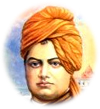|
[Extracts
from Bhagavan Baba's Discourses]
|
||
|
Hinduism is the oldest religion in the world. The three cardinal principles of Hinduism are:
The life aim of Hindus is to reach fulfillment through constant spiritual discipline, the fulfillment that comes from the awareness of one's Divinity. Merging with the Divine is the attainment of fullness. The Vedas are the soul that sustains the spiritual life of Hindus. They are the breath that that keeps the people alive. The Vedas emanated from God Himself. The great sages received the Vedas as a series of sounds and spread it over the world by word of mouth from preceptor to the pupil. One can know from the Vedas the code of right activity and the body of right knowledge. The Vedas teach man his duties from birth to death. They describe his rights and duties, obligations and responsibilities in all stages of life. In order to explain the Vedas in simpler terms, the Puranas (scriptures) and epic texts appeared in course of time. Two such great epics are the Ramayana and Mahabharata. Another great spiritual text of Hinduism is the Bhagavat Geetha, which helps people to control the agitation of the mind, destroy the delusion, develop true knowledge and make one catch a glimpse of the glory of the Lord. The word Hindu means those who keep away from the path of violence, away from inflicting injury on others. The essence of all the scriptural texts of Hinduism can be described in one sentence as "Help Ever, Hurt Never". Aum, which is a primary symbol of Hinduism,
is the symbol of unchanging eternal, universal supreme
God. Aum, is the primordial word, which gives
life to all the other words. Aum is the origin
of creation. It contains the essence of all the Vedas
and is the source of all the scriptures.
|
||
|
